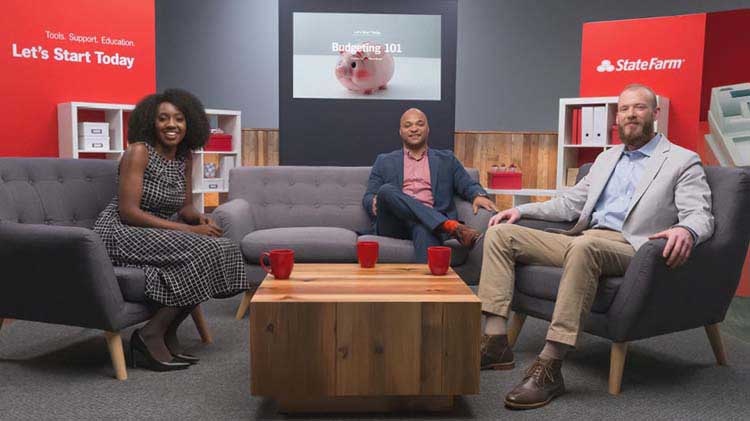Transcript
TONYA: So we've identified that we need our spending habits, we know what we spend most of our money on. And we're saying, Okay, I need to change a few things. What are some of the things that people can do if they realize they need to make an adjustment in their spending habits?
ERIC: A couple of different ways I typically approach this with people I meet with. If you feel like there's one or two categories where you feel like you really want to focus on. You're like, my dining out and my ride sharing, that's what I really struggle with, those two things. Right? Try to give yourself like a weekly allowance. So, explain that.
TONYA: Ah, lunch money.
ERIC: Yeah, lunch money, that’s right. Taking it back. old school. If you feel like you spend on average, you did the math on what you typically spend on dining out and you find out it's $400 a month, right? Break that up into a weekly amount. It's 100 bucks a week, right? So, if you want to make a change, base it off what you have been doing. Because if you don't know how much you've been spending and you set a goal for yourself, it might be unrealistic and that means it's less likely for you to achieve your goal, which can be a little bit demoralizing. And so, when you're budgeting, when you're managing your money, you want to try to set up small wins for yourself along the way. A weekly allowance is one way to do that. Knowing what you typically spend on stuff is another way to do that.
So think about rather than that 100-dollar weekly allowance, maybe you want to try to cut it back to 70 or 80 dollars, right? And then maybe you choose to take the cash out of the ATM every Monday morning, right, and have that go from Monday morning until the next Monday morning. You've got 70 or 80 dollars on dining out.
KAMEREN: Only so much cash.
ERIC: Only use cash when you dine out. Don't use cash for anything else. Don't put any dining out expenses on the credit card or debit card. It can start to become clear how much you spent; how much you've got left. And the weekly timeframe, I think, is key.
KAMEREN: You know, I agree. And everything you said was right. But when you're talking about changing habits, I mean, that is, you know, kind of a difficult thing to do.
TONYA: For most people, yeah.
KAMEREN: For most people, right? What I found is the best catalyst for changing those spending habits is your why has to be really, really strong for why you're going to change that habit. The same lady, she wants to get into investing. And so we look at her budget and she's spending $1600 a month on food and dining. And so, we move $1000 a month to her investment account, which leaves her with $600 a month. To your point, $600 a month for dining out, $150 a week. And with her, you know, that's $22 a day. Can you commit to that, you know, before we move on? And if she has to take away from her dream of investing in real estate or she's less likely to pull from her dream of investing in real estate to stop by a fast-food restaurant.
TONYA: Yeah.
KAMEREN: She's more likely to reach that goal a) because her moneys already spent, but also it’s spent in a place where it really means something to her.
ERIC: Right. And so, you said keep the goals at the forefront, right. Sometimes literally keep the goals at the forefront, right, put it on a Post-It on the bathroom mirror, right. You've got your smartphone; you're looking at it all day anyway.
TONYA: Yeah, definitely.
ERIC: What's your screensaver look like? Because it should look like your next vacation or whatever you're saving up for, right. Maybe it's a graduation cap, you're saving for the kids' college.
KAMEREN: I do that. I put it on my screensaver.
ERIC: Okay.
KAMEREN: And it changes. Something motivational or reaffirming.
TONYA: It's a reminder. Everybody needs reminders every now and again. And everybody needs small wins every now and again. You know, they encourage us to keep going.
ERIC: Yeah. You know, back to a couple of key points on the weekly allowance, just to kind of help explain why that can be helpful is it's a lot more difficult for me to think about, Okay, if I go out to eat with my friends tonight, what's that going to mean for my budget in three weeks? But if I think about it in a week timeframe, if I go out to eat on Tuesday night, am I going to have enough money left over to go hang out on Friday night with my friends? And so that's a lot more digestible of a timeframe, right.
And, believe me, start your allowance on a Monday morning, because if you start it on Friday when you get paid, it's going to be gone by Sunday night.
KAMEREN: Right.
ERIC: I've seen it too many times to count.
TONYA: Yeah, definitely, definitely. And I like that fitness reference because financial goals and maintaining your financial goals is creating a new habit, such as going to the gym, working out, eating properly, and so forth. And we see it time and time again when you're at the gym, you know, you go to different weight classes, you try different things.
KAMEREN: I use that analogy a lot, right. If you are going to -- let's say I want to change my habits and I want to exercise more regularly because I'm going to feel better about myself and yada-yada-yada. See, that's the approach already. As opposed to, in six months, you know, I have a wedding and I've got to get ready to fit into my tux. You know, so now it's a lot more urgent. It's a lot more timely. My approach towards working out or eating right is going to be a lot -- I'm going to be more effective in accomplishing that goal because it's more immediate and it's more specific. Whether it's budgeting or finance or health and fitness, changing a habit. You have to have a really strong why to change your habits in my opinion.
ERIC: And what you just reminded me of is what we were talking about earlier, aspirations and goals, right. I want to start working out again so I could lose weight. That sounds like more of an aspiration. Fitting into a tux in six months, I need to lose six pounds or whatever it might be, that's a goal, right. Working closer toward helping you take some actionable steps.
You know, I think about your weightlifting example or going to the gym. One that often comes to mind when I'm working with people is if you are trying a weekly allowance, and, let's say, your budget for restaurants is 100 bucks a week, and one week you go over and you spend 140 bucks. It’s kind of, you know, you’re not feeling great about it, but at the same time the nice thing is it’s a week, it’s not a month, so you’ve still got three more shots to get it right even in that same month, hopefully, right?
KAMEREN: Right.
ERIC: But if you overspend on your allowance, then what are you going to do the next week? Are you going to try to say, Okay, rather than spending $100, I'm only going to spend 60 this week? You didn't make 100, so how likely are you going to make 60?
KAMEREN: Not likely.
TONYA: Yeah.
KAMEREN: Not likely.
ERIC: That's like going to the gym and saying, All right, I'm going to bench press 200 pounds. I'm going to do it six times. And you get only four reps and that's challenging. It's a little bit frustrating, right. I'm going to go back to the gym next week, I'm going to do 200 pounds and I'm going to do six reps. And I'm going to do instead of 200 pounds, I'm going to do 300 pounds.
TONYA: Yeah, jump all the way in.
ERIC: That's crazy, right. You're setting yourself up for failure when you do that.
KAMEREN: That’s not crazy for me.
ERIC: That's not crazy for Kameren, but for some of us, us mortals.
KAMEREN: For the mortals, I understand.
ERIC: Yeah, absolutely. So that’s the key and like don't be too hard on yourself. Give yourself a fresh start with that same amount the next week.
TONYA: Exactly. So, when you're trying to change your habits, you want to give yourself those weekly goals instead of looking at the big monthly goal because sometimes it's easier to tackle your weekly goal when you break it down into something that's a little more digestible. And giving yourself kind of that runway to work into your goal instead of setting up this goal that you might not be able to reach and then feeling like a failure, feeling that it's unattainable rather than setting something that's closer to your reach.
ERIC: Because what happens when you fail at something?
KAMEREN: You can get demoralized.
ERIC: Yeah.
TONYA: Yeah.
ERIC: And what happens when you get demoralized?
TONYA: Or you're discouraged.
KAMEREN: You're more likely to just give up.
ERIC: Disengage, right.
TONYA: Yeah.
ERIC: And so --
KAMEREN: And that's not what we want.
ERIC: -- how often do I see that with people I work with when I'm doing coaching. They've had a string of failures in the system they've set up for themselves.
TONYA: Yeah, definitely.
ERIC: And then after a while, they're fed up with it. They don't want to continue to feel bad, right?
TONYA: Yeah, and always --
ERIC: So, you want to try to eliminate that. You want to try to create successes for yourself along the way.
TONYA: I always remind people you don't have to be perfect; you just have to be committed. You just have to be committed to your financial goals.
KAMEREN: That's a good point.
(INSERT WEIGHTLIFTING GRAPHIC ANIMATION)
ERIC: So, I like to use this weightlifting analogy, right. So, if you go to the gym and you've got a goal to bench press 200 pounds and you wanna do six reps of it, right, you go through and you start your set and you can only get like four reps; it's just too much, you're not ready for it yet, right. So, when you go back to the gym the next week and you're trying to continue to get better at it, are you going to add 50 pounds to the barbell and try to get another six reps?
KAMEREN: Right. No.
ERIC: No because that wouldn't be setting yourself up for success. Tonya: Yeah. Eric: So, in that same sense that's how you want to think about your weekly allowance. Don't try to play catch up.
KAMEREN: Good point.
TONYA: So now we're all fired up and ready to implement these changes. Let's have a look at what we've learned.
(KEY TAKEAWAY BULLET POINTS APPEAR FULL-UP)
TONYA: Make sure you check out all of our other courses will you find tools support and education. See you next time




